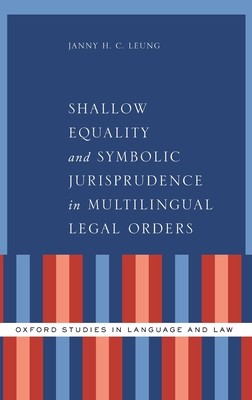
- We will send in 10–14 business days.
- Author: Janny H C Leung
- Publisher: Oxford University Press, USA
- ISBN-10: 0190210338
- ISBN-13: 9780190210335
- Format: 16 x 23.9 x 3.1 cm, hardcover
- Language: English
- SAVE -10% with code: EXTRA
Shallow Equality and Symbolic Jurisprudence in Multilingual Legal Orders (e-book) (used book) | bookbook.eu
Reviews
Description
What challenges face jurisdictions that attempt to conduct law in two or more languages? How does choosing a legal language affect the way in which justice is delivered? Answers to these questions are vital for the 75 officially bilingual and multilingual states of the world, as well as for other states contemplating a move towards multilingualism. Arguably such questions have implications for all countries in a world characterized by the pressures of globalization, economic integration, population mobility, decolonization, and linguistic re-colonization. For lawyers, addressing such challenges is made essential by the increased frequency and scale of transnational legal dealings and proceedings, as well as by the lengthening reach of international law. But it is not only policy makers, legislators, and other legal practitioners who must think about such questions. The relationship between societal multilingualism and law also raises questions for the burgeoning field of language
and law, which posits--among other tenets--the centrality of language in legal processes.
monolingual counterparts, they run the risk of disguising substantive inequalities and displacing real efforts for more progressive social change. This is the first book to offer overarching discussion of how such issues relate to each other, and the first systematic study of legal multilingualism as a global phenomenon.
EXTRA 10 % discount with code: EXTRA
The promotion ends in 17d.02:18:43
The discount code is valid when purchasing from 10 €. Discounts do not stack.
- Author: Janny H C Leung
- Publisher: Oxford University Press, USA
- ISBN-10: 0190210338
- ISBN-13: 9780190210335
- Format: 16 x 23.9 x 3.1 cm, hardcover
- Language: English English
What challenges face jurisdictions that attempt to conduct law in two or more languages? How does choosing a legal language affect the way in which justice is delivered? Answers to these questions are vital for the 75 officially bilingual and multilingual states of the world, as well as for other states contemplating a move towards multilingualism. Arguably such questions have implications for all countries in a world characterized by the pressures of globalization, economic integration, population mobility, decolonization, and linguistic re-colonization. For lawyers, addressing such challenges is made essential by the increased frequency and scale of transnational legal dealings and proceedings, as well as by the lengthening reach of international law. But it is not only policy makers, legislators, and other legal practitioners who must think about such questions. The relationship between societal multilingualism and law also raises questions for the burgeoning field of language
and law, which posits--among other tenets--the centrality of language in legal processes.
monolingual counterparts, they run the risk of disguising substantive inequalities and displacing real efforts for more progressive social change. This is the first book to offer overarching discussion of how such issues relate to each other, and the first systematic study of legal multilingualism as a global phenomenon.


Reviews